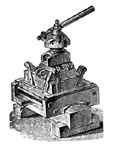
The Winepress
ISLAM VS. THE RELIGION OF THE VINE
Scouting is a great activity, but the Boy Scouts of America betray their roots in Protestantism when they forbid adults from taking anything alcoholic on trips. After a day of coping with 20 male adolescents, a little Merlot would soothe the nerves and allow gentle sleep to fall upon the eyelids. Over the years wives tend to get irritable when husbands spend too many weekends away from home, and wonder what pleasures of freeze-dried food and latrines they are missing. Several scoutmasters in my troop decided to address both the dryness and the loneliness of the scouting weekends by taking our wives hiking; but instead of the Appalachian Trail, we walked through the wine country of California, and, instead of tents, we slept in the country inns that have sprung up like mushrooms. Best of all, a tour company would make the arrangements and supply guides; we didn’t have to consult a map unless we wanted to. In the spring we went to Santa Barbara and in the fall to Napa and Sonoma: the first shoots and the harvest. We saw the ancient civilization of the vine taking root on the shores of the Pacific and saw on a TV screen next to a vineyard the hot blast from the East that set New York and Washington on fire on September 11.
Santa Barbara is where trust funds go when they find the East Coast a little too stodgy. The Indians had a comfortable life here before the Spanish came; but the Spanish were not unwelcome because they brought firearms, which offered some protection against grizzly bears. As we were making our way through overgrown paths in the chaparral, our guide explained that the paths had first been made by grizzlies, which could break through the tough underbrush. The Indians also used the paths, and an encounter with a bear usually ended unpleasantly for the Indian. European guns were a welcome defense. The Spanish built the mission of Saint Barbara, and the Indians decorated it in Aboriginal Rococo. The abalone shell was sacred to the Indians and is used throughout the church. The Franciscans organized a town and a symphony orchestra with strings and tom-toms. It is all very exotic, as exotic as anything I have encountered in the recesses of central Europe. Then the Anglos came, and the Indians largely disappeared.
The wooden Arts-and-Crafts style houses of Santa Barbara survived the last major earthquake in the 1920s, but the commercial heart of the city was destroyed, but quickly rebuilt in a Spanish Mission Movie-House style, with many superfluous towers in honor of Saint Barbara, whose symbol is a tower. The town has now become half-Mexican, and the paseo is in full swing every evening on the main street. I heard more Spanish than English on the streets, which maintained the standards of repair and cleanliness of a small, prosperous, North American city. Santa Barbara is surrounded by estates, orange and lemon groves, oleander-lined lanes. The estates, although fabulously expensive, follow the tradition of severe Spanish architecture that is scarcely distinguishable from Roman estate houses and Cistercian abbeys. The town, between the mountains and the sea, looks like Pompeii.
The Spanish brought vines to California, but the industry did not grow until the Anglos developed it commercially. The valley north of the mountains, the Santa Inez Valley, is wine country. Like superannuated Roman senators, the rich and famous (including Fess Parker, TV’s Davy Crockett, whose wine is marked by a small gold coonskin cap) retire here to grow grapes and make wine. As one ex-investment banker told us, the way to make a small fortune in the wine business is to start out with a large fortune. The vineyards don’t yield a decent crop for seven years, and it takes decades to get the best results. When a man plants a vineyard, he plants it for his grandchildren.
You May Also Enjoy
Perhaps he was so tired of — and so confused by — “seeking his own path” that he joined the first group that offered him certainty, even if it was a false and evil certainty.
The vast majority of anti-Semitic attacks in Europe (and elsewhere) are being perpetrated not by neo-Nazi skinheads but by Muslims. That might explain why we don't hear much about it.
Just days before the massacre of dozens of Christians during a Mass in Baghdad, Iraq's Chaldean Patriarch warned of a 'Satanic plan' to drive Christians out of the Middle East.

